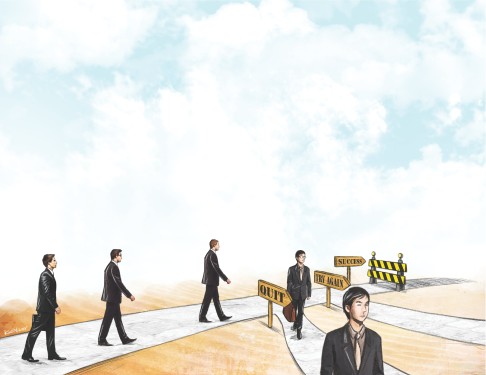It takes courage to know when to quit
The decision to de-list Malaysia Airlines is possibly not going far enough, especially in a lost cause

When is the right time to quit?
Yet again we are fortunate to be able to call on sage advice from the actor W.C. Fields, who said: "If at first you don't succeed, try again. Then quit. No use being a damn fool about it."
News that troubled Malaysia Airlines is to be delisted from the Kuala Lumpur stock exchange by the government-backed Khazanah Nasional wealth fund comes as no surprise, but it may turn out to be an act of quitting that does not go far enough.
Indeed it can be argued that were Malaysia Airlines a purely private company, it might have already given up the ghost. After two fatal air disasters in the space of just four months, it has understandably proved very hard to persuade travellers to opt for this airline. The brand, in other words, has fallen into toxic status.
Whether the company deserves this fate is beside the point, because toxicity is a conclusion not a cause.
Some companies are responsible for their own downfall.
Two prime examples from Britain come to mind, the first being the high street jeweller Ratners, which had half of Britain's retail jewellery market before its founder, Gerald Ratner, gave a notorious speech describing his own goods as "crap".
The company imploded more or less overnight, and Ratner closed it down.
More recently, the media mogul Rupert Murdoch decided to shut down Britain's bestselling News of the World newspaper after it became immersed in scandal over phone tapping and its troubles threatened to contaminate other parts of the company's portfolio. Ratner and Murdoch acted with speed. Over at Malaysia Airlines, it looks as though the folks in charge really believe their brand can be decontaminated by side-stepping the big issue and tidying up around the edges. Their chances of success are low.
On the other hand, by acting fast and decisively, Murdoch cut his losses at the News of the World and promptly launched the Sun on Sunday in its place.

These are well-known examples of company bosses who knew when to quit and were able to start again. Often, however, decisions about when to quit are far less dramatic and far less easy to call.
Parts of businesses go bad, partnerships turn sour and parts of the product line need to be axed, but it is never quite clear when any of these things should be done or indeed whether the problems can be fixed.
In some senses, entrepreneurs are like gamblers who believe that the next hand will turn the tide on their losses. Moreover, they are optimists by nature, with a strong belief in their ability to fix problems. Most do not see themselves as "quitters".
Persistence in the face of unfavourable odds often pays off, and this determination is built into the DNA of people who run businesses.
So, it is far from simple to know when is the right time to quit and when to stay.
If this sounds heartfelt, it is because like everyone I know who has started a business and does not have the Bank of Daddy for back-up, these painful decisions crop up regularly.
Sometimes, the decision is complicated by pride and the reluctance to admit failure; sometimes, sentimental attachment to people and things makes it hard to focus on the real issues.
However, having the courage to quit is every bit as commendable as having the courage to start something new.
I have to admit that I am in the slow lane when it comes to abandoning a project or, indeed, an entire company.
Colleagues invariably come to me with depressing figures showing why it's not worth going on with a loss-making business. I cling to the illusion that losses can be turned into profit, but there is always a point at which it makes no sense to press on.
If I were smart about all this, I would have reached this point before the red ink starts flowing freely over the accounts, but such prescience is beyond me.
Indeed I suspect that most entrepreneurs are similarly lagging in these matters.
My way of dealing with it is to have something new to move on to before abandoning whatever it is that needs to be abandoned.
There is some comfort in the thought that to succeed you need to have experienced loss; there may be something in this notion, but it still has the hollow ring of a platitude.
Meanwhile over at Malaysia Airlines, they have the comfort of access to other folk's money while they ponder on how long they must wait before accepting the inevitable.
Stephen Vines runs companies in the food sector and moonlights as a journalist and broadcaster